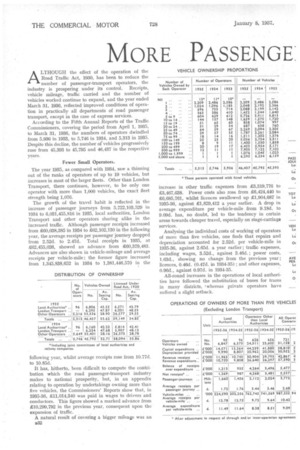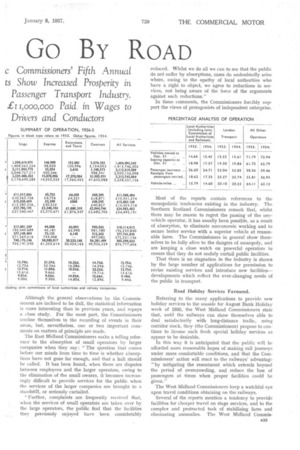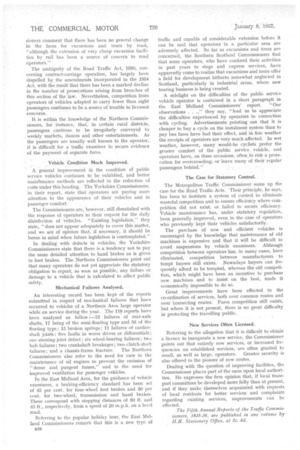MORE PASSENGE
Page 46

Page 47

Page 48

If you've noticed an error in this article please click here to report it so we can fix it.
Go BY ROAD ALTHOUGH the effect of the operation of the Road Traffic Act, 1930, has been to reduce the number of passenger-transport operators, the industry is prospering under its control. Receipts. vehicle mileage, traffic carried and the number of vehicles worked continue to expand, and the year ended March 31, 1936, reflected improved conditions of operation in practically all departments of road passenger transport, except in the case of express services.
According to the Fifth Annual Reports of the Traffic Commissioners, covering the period from April 1, 1935, to March 31, 1936, the numbers of operators dwindled from 5,936 in 1933, to 5,746 in 1934, and 5,313 in 1935. Despite this decline, the number of vehicles progressively rose from 45,393 to 45,795 and 46,437 in the respective years.
Fewer Small Operators.
The year 1935, as compared with 1934, saw a thinning out of the ranks of operators of up to 19 vehicles, but increases in most of the larger fleets. Other than London Transport, there continues, however, to be only one operator with more than 1,000 vehicles, the exact fleet strength being 1,076.
The growth of the travel habit is reflected in the increase of passenger journeys from 5,722,103,529 in 1.934 to 6,031,455,816 in 1935, local authorities, London Transport and other operators sharing alike in the increased traffic. Although passenger receipts increased from £60,038,385 in 1934 to £62,102,130 in the following year, the average receipts per passenger journey dropped from 2.52d. to 2.47d. Total receipts in 1935, at 262,455,026, showed an advance from 260,379,483. Advances are also shown in vehicle-mileage and average receipts per vehicle-mile: the former figure increased from 1,345,838,652 in 1934 to 1,381,446,570 in the following year, whilst average receipts rose from 10,77d. to 10.85d.
It has, hitherto, been difficult to compute the contribution which the road passenger-transport industry makes to national prosperity, but, in an appendix relating to operation by undertakings owning more than five vehicles, the Commissioners' Reports show that, in 1935-36, £11,014,340 was paid in wages to drivers and conductors. This figure showed a marked advance from 210,299,792 in the previous year, consequent upon the expansion of traffic.
A natural result of covering a bigger mileage was an 832 increase in other traffic expenses from 23,319,776 to £3,467,638. Power costs also rose from £6,424,440 to £6,685,761, whilst licences swallowed up 21,904,687 in 1935-36, against £1,829,412 a year earlier. A drop in average expenditure per vehicle-mile from 9.18d. to 9.09d. has, no doubt, led to the tendency in certain areas towards cheaper travel, especially on stage-carriage services.
Analysing the individual costs of working of operators of more than five vehicles, one finds that repairs and depreciation accounted for 2.52d. per vehicle-mile in 1935-36, against 2.65d. a year earlier ; traffic expenses, including wages, 3.52d., against 3.46d.; power costs, 1.63d., showing no change from the previous year ; licences, 0.46d. (0.47d. in 1934-35) ; and other expenses, 0.96d., against 0.97d. in 1934-35.
All-round increases in the operations of local authorities have followed the substitution of buses for trams in many districts, ) whereas private operators have suffered a slight setback.
Although the general observations by the Commissioners are inclined to be dull, the statistical information is more interesting than in previous years, and repays a close study. For the most part, the Commissioners confine themselves to the recording of events in their areas, but, nevertheless, one or two important cornments on matters of principle are made.
The East Midland Commissioners snake a telling reference to the absorption of small operators by larger companies when they say : "The question that comes before our minds from time to time is whether absorptions have not gone far enough, and that a halt should be called. It has been found, when there are disputes between employees and the larger operators, owing to the elimination of the small owners, it becomes increasingly difficult to provide services for the public when the services of the larger companies are brought to a standstill, or seriously curtailed.
"Further, complaints , are frequently received that, when the services of small operators are taken over by the large operators, the public find that the facilities they previously enjoyed have been considerably Most of the reports contain references to the monopolistic tendencies existing in the industry. The Southern Scotland Commissioners remark that, whilst there may be reason to regret the passing of the onevehicle operator, it has usually been possible, as a result of absorption, to eliminate uneconomic working and to secure better service with a superior vehicle at reasonable fares. The Commissioners in general show themselves to be fully alive to the dangers of monopoly, and are keeping a close watch on powerful operators to ensure that they do not unduly curtail public facilities.
That there is no stagnation in the industry is shown by the large number of applications for permission to revise existing services and introduce new facilitiesdevelopments which reflect the ever-changing needs of the public in transport.
Road Holiday Services Favoured.
Referring to the many applications to provide new holiday services to the seaside for August Bank Holiday week of 1936, the West Midland Commissioners state that, until the railways can show themselves able to deal satisfactorily with long-distance traffic, using corridor stock, they (the Commissioners) propose to continue to license such fresh special holiday services as appear to be desirable.
In this way it is anticipated that the public will be afforded more reasonable hopes of making rail journeys under more comfortable conditions, and that the Commissioners' action will react to the railways' advantage "by mitigating the resentment which extends beyond the period of overcrowding, and reduce the loss of passengers at times when proper facilities could be given."
The West Midland Commissioners keep a watchful eye upon travel conditions obtaining on the railways.
Several of the reports mention a tendency to provide facilities for cheaper travel on stage services, and to the complex and protracted task of stabilizing fares and eliminating anomalies. The West Midland Commis sioners comment that there has been no general change in the fares for excursions and tours by road, " although the extension of very cheap excursion facilities by rail has been a source of concern to road operators."
The ambiguity of the Road Traffic Act, 1930, concerning contract-carriage operation, has largely been dispelled by the amendments incorporated in the 1934 Act, with the result that there has been a marked decline in the number of prosecutions arising from breaches of this section of the law. Nevertheless, competition from operators of vehicles adapted to carry fewer than eight passengers continues to be a source of trouble to licensed concerns.
It is within the knowledge of the Northern Commissioners, for instance, that, in certain rural districts, passengers continue to be irregularly conveyed to weekly. markets, dances and other entertainments. As the passengers are usually well known to the operator, it is difficult for a traffic examiner to secure evidence of the payment of separate fares.
Vehicle Condition Much Improved.
A general improvement in the condition of public service vehicles continues to be exhibited, and better maintenance methods are reflected in the reduction of costs under this heading. The Yorkshire Commissioners, in their report, state that operators are paying more attention to the appearance of their vehicles and to passenger comfort.
The Commissioners are, however, still dissatisfied with the response of operators to their request for the daily disinfection of vehicles. "Existing legislation," they state, "does not appear adequately to cover this matter, and we are of opinion that, if necessary, it should be borne in mind when future legislation is contemplated."
In dealing with defects in vehicles, the Yorkshire Commissioners state that there is a tendency not to pay the same detailed attention to hand brakes as is giVen to foot brakes. The Northern Commissioners point out that many operators do not yet appreciate the statutory obligation to report, so soon as possible, any failure or damage to a vehicle that is calculated to affect public safety.
Mechanical Failures Analysed.
An interesting record has been kept of the reports submitted in respect of mechanical failures that have occurred to vehicles of a Northern Area large operator while on service during the year. The 11 reports have been analysed as follow :-73 failures of rear-axle shafts, 17 being of the semi-floating type and 56 of the floating type ; 15 broken springs ; 11 failures of cardanshaft joints ; five faults in worm drives or differentials ; one steering-joint defect ; six wheel-bearing failures: two hub failures ; two crankshaft breakages; two clutch-shaft failures ; and a chassis-frame fracture. The Northern Commissioners also refer to the need for care in the maintenance of oil engines to prevent the emission of "dense and pungent fumes," and to the need for improved ventilation for passenger vehicles.
In the East Midland Area, for the guidance of vehicle examiners, a braking-efficiency standard has been set of 45 per cent, for four-wheel foot brakes and 30 per cent. for two-wheel, transmission and hand brakes. These correspond with stopping distances of 30 ft. and 45 ft., respectively, from a speed of 20 m.p.h. on a level road.
Referring to the popular holiday tour, the East Midland Commissioners remark that this is a new type of s34 traffic and capable of considerable extension before it can be said that operators in a particular area are adversely affected. So far as excursions and tours are concerned, the Southern Scotland Commissioners find that some operators, who have confined their activities in past years to stage and express services, have apparently come to realize that excursions and tours offer a field for development hitherto somewhat neglected in Scotland, particularly in industrial areas, where new touring business is being created.
A sidelight on the difficulties of the public service vehicle operator is contained in a short paragraph in the East Midland Commissioners' report. "Our observations . . .," they say, "lead us to appreciate the difficulties experienced by operators in connection with cycling. Advertisements pointing out that it is cheaper to buy a cycle on the instalment system than to pay bus fares have had their effect, and in fine weather the receipts of operators are very much affected. In wet weather, however, many would-be cyclists prefer the greater comfort of the public service vehicle, and operators have, on these occasions, often to risk a prosecution for overcrowding, or leave many of their regular passengers behind."
The Case for Statutory Control.
The Metropolitan Traffic Commissioner sums up the case for the Road Traffic Acts. Their principle, he says, has been to institute a system of control to eliminate wasteful competition and to ensure efficiency where competition did not exist, or failed to secure efficiency. Vehicle maintenance has, under statutory regulation, been generally improved, even in the case of operators who previously kept their vehicles satisfactorily.
The purchase of new and efficient vehicles is encouraged by the knowledge that maintenance of old machines is expensive and that it will be difficult to avoid suspensions by vehicle examiners. Although competition between operators has, in many cases, been eliminated, competition between manufacturers to tempt buyers still exists. Nowadays buyers can frequently afford to be tempted, whereas the old competition, which might have been an incentive to purchase new machines and to insist on the best, made it economically impossible to do so.
Great improvements have been effected in the co-ordination of services, both over common routes and over 'connecting routes. Fares competition still exists, but where it is not present, there is no great difficulty in protecting the travelling public.
New Services Often Licensed.
Referring to the allegation that it is difficult to obtain a licence to inaugurate a new service, the Commissioner points out that entirely new services, or increased frequencies on established services, are often granted to small, as well as large, operators. Greater security is also offered to the pioneer of new routes.
Dealing with the question of improving facilities, the Commissioner places part of the onus upon local authorities. He expresses the firm opinion that, if local transport committees be developed more fully than at present, and if they make themselves acquainted with requests of local residents for better services and complaints regarding existing services, improvements can be effected.
The Fifth Annual Reports of the Traffic Commissioners, 1935-36, are published in one volume by H.M. Stationery Office, at 2s. 6d.




























































































